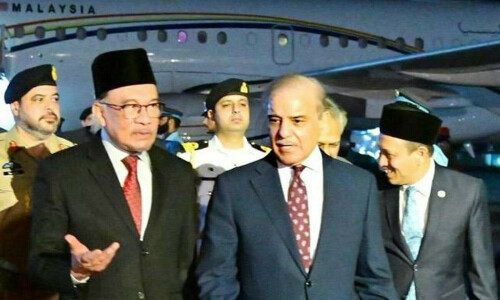The tail-end areas of Sukkur and Kotri barrages face unending water shortage problems. Both barrages feed large swathes of agricultural lands in left bank areas — known as the breadbasket of Sindh — of the river Indus where cash crops like cotton, rice and sugarcane are produced. Mango and banana orchards also located here.
Farmers complain of water shortage in almost every Kharif season. Those who have lands in Kotri barrage’s tail-end commands suffer the most. These are small or medium landowners who lack political clout in the existing governance structure as inadequate water flow problems are rare in the upper reaches of canals fed by these two barrages.
Kotri barrage’s two canals — Akram Wah (a perennial canal that runs around the year) and New Phuleli (a non-perennial system which works for six months of the summer) — fall under the jurisdiction of the Sindh Irrigation and Drainage Authority (Sida).
Water flows had improved at Guddu and Sukkur barrages last month. Given the recent rainfalls in Sindh, the Kotri barrage management decided to reduce flows in channels to avoid breaches or damages. This has upset growers who had started cultivating paddy after the recent respite.
Successive governments have allowed direct outlets to canals as a political favour resulting in an interruption of flow to tail-enders
Water shortage is a menace for tail-end farmers. They are destined to face severe water shortages during Kharif season because of a number of reasons including the shifting of the command area from Sukkur barrage to Kotri barrage, political influence, outdated irrigation system, official lethargy, direct outlets (DOs) and illegal water-lifting pipes.
Farmers deeply mistrust Sindh irrigation department officials, which is why they often press for the deployment of paramilitary forces, such as Rangers, along the Rohri and Kotri barrage canals to control water theft and ensure its availability.
Farmers have filed dozens of cases before the Sindh High Court (SHC) to seek judicial intervention this summer. In a number of cases, the SHC has directed chief secretary Sindh to ensure the deployment of Rangers along canals to remove illegal pipes used for diverting water to some powerful landowners.
SHC has also ordered the re-examination of all DOs of Rohri canal by a committee of experts. The committee is to finalise its findings in two months for submission to the court.
Water shortages force irrigation authorities opting for a rotation programme that creates another set of problems. The canals are unable to carry water to tail-end reaches of their systems because of silting in canals and huge conveyance and water losses at field level that compromises water distribution further.
The chief minister’s special assistant on irrigation Ashfaq Memon concedes that the farmers’ woes are justified. “The government has planned reinforced cement concrete (RCC) works for DOs, watercourses and regulators under its Annual Development Plan (ADP) and this intervention will hopefully put an end to tampering with modules. Around 200 illegal pipes were from Akram Wah,” he says.
Farmers mentioned in the SHC that 65 DOs are sanctioned in the Naseer brand of Rohri canal alone. A landowner who applies to the government for a DO claims that his land is not getting the water it needs, therefore he needs a direct source of water. While the claim requires verification, the process is a mere formality.
In theory, only a certain diameter of the pipe can be approved for a DO for the lifting of water which is restricted to certain times. In reality, specifications are not met and machines pump water till the land is irrigated fully. Experts considered such DOs with assured water supplies as disastrous for any canal’s water flow regime.
Successive governments have allowed DOs as political favours to their men. Influential ones including Syeds, Legharis, Bachanis, Pitafis, Magsis, Marris, former members of law enforcing agencies, bureaucrats, police and other government functionaries are prime beneficiaries of DOs to get maximum water flows. They irrigate their lands completely at the cost of the small tail-end growers who have no choice but to wait for their turn to get water.
“Beneficiaries of DOs do not follow the recommended specifications to ensure that they get uninterrupted flow. It is the DOs that make us suffer us as they remain fully functional around the year,” complains Karamullah Saand, a co-petitioner in one of the recent petitions filed before the SHC. He refers to a previous survey report which says that DOs mostly draw 300pc to 500pc more water than what their designs permit.
Another leading cause of water shortage is the shifting of around 200,000 acres of agricultural lands from Sukkur barrage’s command to Kotri barrage over the last several years owing to political influence.
The 200,000 acres that fall under Rohri’s command now regularly draws water from New Phuleli and Akram Wah. “It is unfair that khatedars who have the first right to get water from Kotri barrage are ignored and lands under Sukkur barrage’s command is given preference,” remarks Sindh Chamber of Agriculture vice president Nabi Bux Sathio.
Under the Water Apportionment Accord 1991 water allocations for these areas are made for Rohri canal and Kotri barrage doesn’t get additional allocations for its canals over and above the accord’s estimations. However, unofficial figures indicate around 3,000 cusecs of water is diverted for these areas from Kotri barrage to make things difficult for tail-end farmers.
Published in Dawn, The Business and Finance Weekly, August 19th, 2019












































